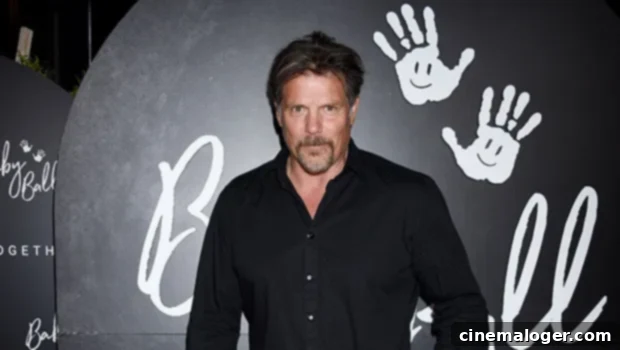Beyond the Villain: Paul Johansson’s Candid Battle with Depression and Alcoholism While Portraying Dan Scott on One Tree Hill
For years, fans of the beloved drama One Tree Hill watched Paul Johansson captivate audiences with his complex portrayal of the villainous Dan Scott. Behind the scenes, however, Johansson was fighting a deeply personal and silent battle. The acclaimed actor recently opened up about his profound struggles with depression and heavy alcohol consumption throughout his tenure on the hit series, shedding light on the immense pressure and psychological toll that fame and a demanding role can exert on an individual.
Johansson’s candid revelations came to light during an episode of the Trying to Figure it Out podcast with Ally Petitti, which aired on Tuesday, December 19. During the heartfelt interview, he courageously recounted his “awful” experiences with depression and alcoholism while actively filming One Tree Hill, a period spanning nearly a decade from 2003 to 2012. His confession offers a rare glimpse into the often-unseen challenges faced by those in the public eye, highlighting the critical importance of mental health awareness within the entertainment industry and beyond.
The Weight of a Villain: Portraying Dan Scott
On One Tree Hill, Paul Johansson brought to life Dan Scott, the fiercely ambitious and often cruel father of Nathan (James Lafferty) and Lucas Scott (Chad Michael Murray). Dan quickly established himself as the show’s primary antagonist, his character driven by a desperate need for control, particularly over Nathan’s burgeoning basketball career. His manipulative tactics, betrayals, and morally ambiguous actions made him one of television’s most memorable villains, a character audiences loved to hate – and occasionally, to empathize with, as his complex layers were gradually revealed.
The series, which aired for an impressive nine seasons, demanded a consistent and intense performance from Johansson. Playing a character so steeped in negativity, jealousy, and anger for such an extended period inevitably began to blur the lines between actor and role. Johansson admitted that the pervasive darkness of Dan Scott began to seep into his own life, a phenomenon not uncommon for actors deeply committed to their craft, particularly when inhabiting such emotionally taxing roles. The constant immersion in Dan’s world of resentment and ambition took a significant psychological toll, contributing to the downward spiral he experienced off-screen.

A Deepening Crisis: Depression and Alcoholism
The actor frankly confessed that during the peak of One Tree Hill‘s production, he found himself grappling with profound mental health challenges. “I was deeply depressed and I was drinking,” he revealed, painting a stark picture of his private torment. He described a nightly ritual of consuming “a couple bottles of wine by myself in my house, sitting at the piano, trying to figure out my life.” This isolating struggle persisted for “about six or seven years,” coinciding directly with a substantial portion of the show’s run. The solitude and the reliance on alcohol became a desperate attempt to cope with the emotional burden he was carrying, both from his personal life and the heavy energy of his character.
Johansson’s experience underscores a critical issue in high-pressure industries like Hollywood: the silent battle many individuals face with mental health and substance abuse. The demands of long filming hours, constant public scrutiny, and the psychological weight of inhabiting complex characters can create a fertile ground for such issues to develop. His honesty serves as a powerful reminder that behind the glitz and glamour, actors are human beings susceptible to the same vulnerabilities as anyone else, often exacerbated by the unique pressures of their profession.
Blurring Lines: Fan Interactions and Public Perception
The intense nature of Dan Scott’s character also presented unique challenges in Paul Johansson’s real life. Fans, deeply invested in the storylines and characters of One Tree Hill, often struggled to separate the actor from the villain he portrayed. Johansson recounted several instances where he was confronted by fans who were unable to make this distinction, seeing him through the lens of Dan Scott’s nefarious actions. “It was just a time when I think that I was absorbing the energy of the people that were looking at me, and seeing me as something that’s bad and not good,” he explained. This absorption of negative public perception undoubtedly contributed to his already fragile mental state, making it even harder to escape the shadow of his character once the cameras stopped rolling.
The phenomenon of an actor being typecast or, worse, reviled due to a fictional role, is a well-documented aspect of the industry. For Johansson, this wasn’t just a professional hurdle but a personal one, impacting his daily interactions and self-perception. The constant barrage of associating him with a “bad” character meant that even outside of work, he felt a weight of judgment, reinforcing the negativity he was battling internally. It speaks volumes about the power of storytelling and the deep emotional connection audiences form with television characters, for better or worse, and the unexpected consequences this can have on the performers themselves.
The End of an Era and the Road to Reinvention
The actor admitted that the conclusion of One Tree Hill brought a profound sense of relief. “To get out of it, honestly, the way to do it was the show had to end for me. I was actually grateful when it ended, because it had run its full course,” he stated. The series’ finale provided him with a much-needed escape, an opportunity to shed the heavy mantle of Dan Scott and pursue new roles and experiences. He yearned “to get other characters and feel other things,” a testament to how deeply ingrained the role had become in his psyche.
However, the legacy of playing such an iconic villain also presented its own set of professional challenges. Johansson found himself frequently “getting bad guy roles again because of that show,” lamenting that it “put me in a box.” This common predicament for actors who achieve massive success in a specific type of role highlights the difficulty of career reinvention in Hollywood. Despite his desire to explore different facets of his acting ability, the indelible impression left by Dan Scott continued to shape the offers and perceptions he encountered, making it a slow and arduous process to break free from the villainous archetype.
Behind the Scenes: Friendships and Farewell
Beyond his personal struggles, Paul Johansson also shared intriguing insights into the making of One Tree Hill. He recounted details of his audition process, offering a glimpse into the initial stages of bringing Dan Scott to life. Furthermore, he spoke about the poignant experience of filming Dan Scott’s death in the penultimate episode of the series, an emotional farewell to a character that had defined a significant portion of his life and career. For a character as pivotal and polarizing as Dan, his eventual redemption and demise were significant moments for both the show and the actor portraying him.
Johansson also revealed his deep emotional connection to his castmates, particularly when discussing the death of Craig Sheffer’s character, Keith Scott. He was “heartbroken” by Keith’s on-screen demise, underscoring the powerful bonds forged among the cast and crew over years of working together. These relationships, built on shared experiences and mutual support, clearly transcended the fictional rivalries and tragedies depicted on screen. To this day, the cast remains incredibly close, with Johansson proudly stating, “We were all there for each other,” and confirming that they are “still on group texts.” This enduring camaraderie provides a touching counterpoint to the individual struggles, illustrating the family-like atmosphere that often develops during long-running productions.
A Broader Conversation: Actor Well-being in Hollywood
Paul Johansson’s courageous confession not only sheds light on his personal journey but also contributes to a larger, increasingly vital conversation about mental health and well-being within the entertainment industry. His story is a powerful reminder that the demands of fame, the intensity of character work, and the public’s perception can have profound and sometimes detrimental effects on individuals. It highlights the need for greater support systems, open dialogue, and destigmatization of mental health issues in a profession that often prioritizes external image over internal struggles.
His willingness to share such a vulnerable period of his life serves as an inspiration for others facing similar challenges, both inside and outside of Hollywood. By speaking out, Johansson helps to normalize conversations around depression and addiction, reinforcing the message that seeking help and acknowledging personal battles is a sign of strength, not weakness. His journey from the darkness of absorbing his character’s negativity to a place of candid reflection offers hope and encourages a greater understanding of the complex relationship between art, life, and the human psyche.
